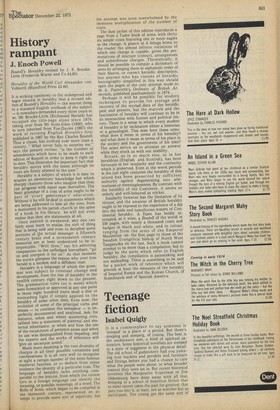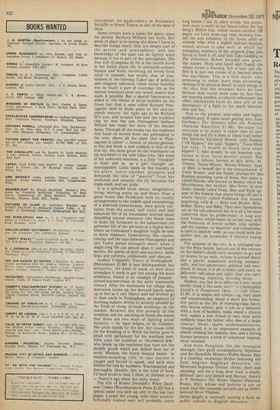Teenage fiction
Isabel Quigly
It is a commonplace to say someone is 'steeped' in a place or a period. But there's steeping and steeping, of course. The best is the unobtrusive sort, a kind of spiritual saturation. Some historical novelists are steeped to a state of sogginess in the physical detail, The old school of gadzookery had you yawning over buckles and perukes and furniture and fittings before you had a chance to care what the people were about, or what broader context they were set in. But recent historical novelists like Margeurite Yourcenar or Zoe Oldenbourg have done away with all that, bringing in a school of historical fiction that to some extent takes the past for granted; that puts you into it, at least, not as watcher but as participant. The young get the same sort of
-treatment: no gadzookery in Rosemary Sutcliffe or Henry Treece, in any of the best of them.
Some writers have a talent for place, some for period. Barbara Willard has both. Her sense of place is so strong she doesn't have to describe things much, they are simply part of the 'action and atmosphere; and her knowledge of the past can be lightly worn because it too is part of the atmosphere. The Iron Lily (Longman £1.75) is the fourth novel in her series about life in sixteenth-century Sussex and Kent, involving all levels from royal to peasant, but mostly that of ironmasters in the thriving Tudor age of political and religious upheaval, when social mobility was as much a part of everyday life as the natural resources (iron ore, wood, water) that made it possible. But a special fascination is added to this theme of social mobility by the (true) fact that a man called Richard Plantagenet died in those parts in the mid-sixteenth century, the right age to be Richard Ill's son; and around him and the tradition that he was the last Plantagenet Thsarbara Willard has made her story of his descendants. Through all the books run the emblems that hand on secrets from one generation to the next, above all the plant that is 'Plantagenet in cipher' — broom, or planta genista; in this last book, a new emblem is that of the iron lily, the name given by the ironmaster on his deathbed to his wife Lilias who, like some of her unknown relations, is a little "crooked" in body and so, as a girl, thought unmarriageable. Lilias takes on the foundry in his place, starts another, prospers and demands the title of "master" from her workmen and tenants; the lily becomes her
trade-mark and her pride.
It is a splendid book, dense, imaginative, living; moving easily up and down, from a great house like Penshurst with its courtly arrangements to the middle aged meanderings of a widowed tinkerwoman, once gently nurtured; from the proud, half rustic and half industrial life of an ironmaster worried about dwindling natural resources (the forest trees to stoke his furnaces) to the subservient yet genteeler life of the servants at a higher level, where an ironmaster's daughter might be sent to learn manners. Generations, like classes, overlap and the time between Plantagenet and late Tudor seems strangely short, when a single long life can almost span it; and family secrets, the quirks of birth and ancestry, make links and patterns, emblematic and obscure.
Audrey Coppard's Nancy of Nottingham (Heinemann £1.60) is less distinguished, but attractive; the kind of book so well done nowadays it tends to get lost among the more ambitious. Nancy is an example of peasantturned-townswoman in the early nineteenth century. After the enclosures her village dies, starvation looms up, the devoted family splits Up to live-as it can. Nancy and her brother go to their uncle in Nottingham, an employer of stocking-makers driven to poverty himself by the flood of cheap ill-made stockings on the market. Between the dire poverty of the workless and the pinching at home she learns that there are two ways of fighting social injustice — by legal means, or by violence. Her uncle stands for the law, her cousin John for the breaking of it. While his father goes to plead with parliament for his workless men, John joins the Luddites or 'Sherwood lads,' who break up the machines that turn out the shoddy goods which put skilled men out of work. Masked, the forest maquis keeps ' to modern-sounding cells, in case anyone is caught and forced to speak, and each man knows the rest by numbers. Warmhearted and thoroughly likeable, this is the kind of book I'd have loved to find, I think, at thirteen or so — Nancy's age when the story starts.
' The title of Robert Swindell's When Darkness Comes (Brockhampton Press £1.25) has a special point you pick up only in the last two pages; a point the young, with their sciencefictionally trained ears, will probably catch long before I did. In other words, this prehistoric story is really in our future (after the 'big bang'). Before that, which means another 150 pages. we have stone-age man thinking himself the sole inhabitor of the forest until an outside tribe with a higher culture (metals, wheel) arrives to take over; at which the wrangling members of the original tribe join forces to fend it off, and win. Like Golding in The Inheritors, Robert Swindell uses gruntlike names, Morg and Gawl and Trond; the winter forest is freezing, full of bear and elk; flint is in just one corner of it, beyond which lies starvation. This is a first novel, very promising or rather more than promising;
exciting in its physical detail, in such things as the idea that the invaders have no toes because their tracks show none (in fact they are wearing sandals, a cultural refinement the older inhabitants have no idea of); or its description of a fight to the death between bear and boy.
Now to the present, near-adult and highly sophisticated. It takes some getting into, Jane
Gardam's The Summer after the Funeral
(Hamish Hamilton £1.40), because (a) everyone is so scatty it takes time to sort things out and (b) it does at times read rather like pastiche Elizabeth Bowen, only funnier ("Oh kippers," she said, "kippers." Tears filled her eyes. "I would so much love some kippers "). Also people, to my hopeless confusion at first, have several names. The heroine is Athene, known as Ath, Athy. At, Theeny, Teeny-Weeny, Weeny-Theeny, Assy or Mim; to herself she is the reincarnation of Emily Bronte and she finally plumps. for thei. Russian-sounding name of Anna. Her sister is called Phoebe, also known as Beams, short for Moonbeams; her mother, Mrs Price, is also Dodo; friends called Posie, Boo and Sybil appear at the funeral that starts things off and a whole family called Padshaw has names beginning with B — Bess and Boofie, Billy. Bobby. Bunty and Baby. They sort themselves out as the tale advances but it is all a lot more
contrived than its predecessor. A long way from Verona, which burst on us last year with
the freshness of lemon sorbet, only solider; and the heroine, so beautiful and remarkable, is hard to identify with, as one could with the earlier one, an accessible if literary young person. The summer of the title is a confused one for the Price family, turned out of the rectory on the father's death with nowhere to go and no money to go with. Athene is posted about like a parcel, sometimes arriving unexpec tedly, and has adventures, spiritual and emotional. In detail, it is all so funny and exact, so delicately ridiculous and right, that you can't help cheering, enjoying, wanting more. Modern, too, but in so different a way you'd hardly think it the same worl ' is Christopher
Leach's A Temporary Open lt,. Life (Dent,
£1.30). It is simple and competing, very plain and unpatronising; about a short but forma tive patch in the life of working-class Davy, who leaves school, gets a job as a labourer with a firm of builders, helps mend a church roof, makes a new friend or two, then quite suddenly loses his father, who dies of a brain tumour. Short, spare, undemonstrative, closepacked, it is an impressive example of almost nothing but realism; that, and a strong, literary presence, a kind of 'otherness' implied, never stressed.
And from Penguins, for the youngish teenager, two good stockingfillers: Septimus and the Danedyke Mystery (Puffin Books, 25p)
is a cheerful, exuberant thriller featuring the East Anglian Anglican detective, the
Reverend Septimus Treloar, chirpy, short and amusing; and for a long slow read, a totally different pace and period and .flavour, there's A. P. Herbert's The Water Gipsies (Peacock Books, 45p), whose real heroine is not so much Jane the romantic servant-girl as APH's beloved River Thames.
Isabel Quigly is currently writing a book on public schools in English literature.



































 Previous page
Previous page